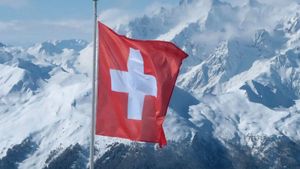The Alternative for Germany (AfD), led by Alice Weidel, has declared its historic election performance as the second strongest party after the recent Bundestag elections, nearly doubling its vote share since 2021. Weidel proudly declared, "Our hand will always be outstretched for participation in government," signaling the party’s ambitions for inclusion in the political process.
Weidel’s proclamation of the party's achievement as historic encapsulates its rise, as she noted, "We have recorded historic results. We have never been stronger nationally." This sentiment was echoed amid jubilant celebrations at the AfD headquarters on election night, where party officials and supporters convened to mark the occasion.
According to exit polls from ARD and ZDF, the AfD has surged to around 19.5 to 20 percent of the vote, representing almost double its previous share. Notably, this election saw substantial gains among young voters, with many analysts indicating this demographic shift as pivotal to the AfD’s newfound strength.
Weidel articulated her ambitions for the next parliamentary elections, asserting, "Our goal is to finally surpass the Union and become the strongest party in Germany. This is the aim," as her supporters cheered enthusiastically.
The AfD leadership has positioned itself as the political middle ground, with co-leader Tino Chrupalla stating, "We have now firmly anchored ourselves as the people’s party." This self-identification aims to normalize the party within the political spectrum, moving away from its previous role as the radical opposition.
Despite these ambitions, the prospect of forming government coalitions remains bleak. The CDU and CSU have consistently rejected any possibility of collaboration with the AfD. Friedrich Merz, the CDU's Chancellor candidate, asserted, "There will be no coalition with the AfD," differentiates himself from the party’s far-right elements.
Weidel did not shy away from directing warnings at the Union, cautioning against alliances with leftist parties. "If the CDU commits electoral fraud against its own voters by forming coalitions with left parties, then the next election will come sooner than you think, and then we will overtake the CDU as the leading force," she remarked, solidifying her party's commitment to their electoral promises.
The rising influence of the AfD has raised serious concerns across German society. Josef Schuster, president of the Central Council of Jews, expressed his alarm, stating, "It must trouble us all, as one-fifth of German voters are casting their votes for at least partially far-right extremist parties." Schuster emphasized the necessity for realistic solutions from the political center, as the likelihood of challenging far-right ideology grows stronger.
The AfD claims it is gaining traction particularly among workers and individuals feeling dissatisfied with their current economic conditions. Reports indicate the party received 38 percent support from workers and those dissatisfied with their economic situations, marking significant shifts in voter sentiment.
Despite historic performance, challenges loom for the AfD as they face opposition from all other significant parties, limiting their pathways to actual governance. Political analyst Wolfgang Schroeder described the emergence of Weidel as "the un-crowned queen of the AfD," recognizing her increased visibility during the campaign.
Looking forward, Weidel and her party intend to assert influence within parliament. She hinted at potential parliamentary investigations, including proposals for inquiries related to the COVID-19 policies and the Nord Stream pipeline incidents, aiming to hold those responsible accountable.
The political scene remains fraught with tension as the traditional parties react to the AfD's rise. Weidel’s efforts to maintain pressure on the CDU reflect broader anxieties about maintaining political platforms free from the influence of far-right agendas.
Moving forward, the AfD aims to leverage its recent successes to solidify its power and sustain its electoral momentum, continuing to challenge the established political framework of Germany.



